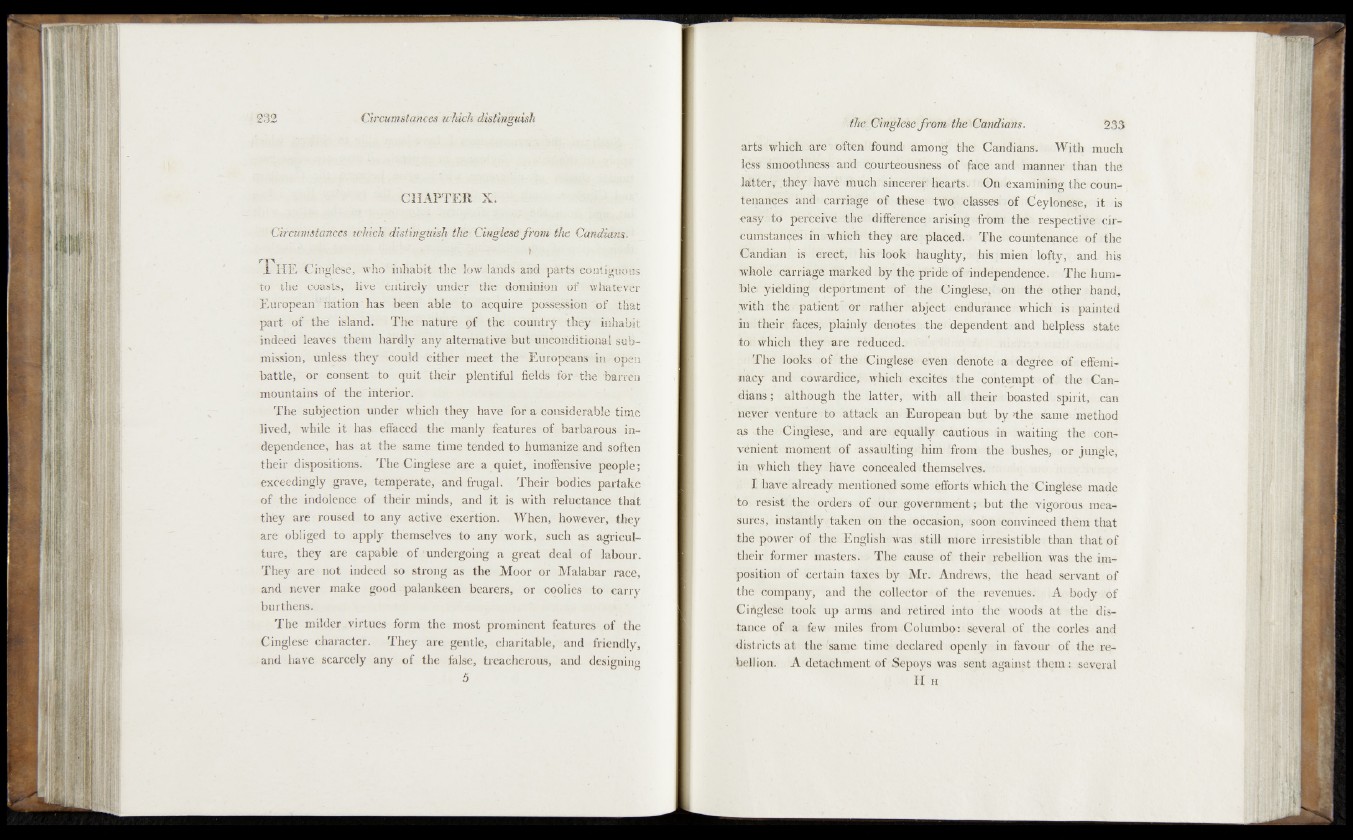
CHAPTER X.
Circumstances tvhich distinguish the Cinglese from the Candians.
}j
r r \ '
X H E .Cinglese, who inhabit the low-lauds and partseorffigucffls
to the coasts, live^ entirety" under' the dominion of whatever
European' ’nation' has been able to acquire possession of that
part of the island. The nature^ of the country they inhabit
indeed leaves them hardly any alternative but unconditional submission,
unless they could either meet the Europeans^ in open,
battle, or consent to q u it' their plentiful ffelds'fbr-the'baiTen
mountains of the “interior.
The subjection under which they have for a considerable time
lived, while i t has effaced the manly'^features* of barbarous independence,
has at the same time tended to humanize and soften
their dispositions. The Cinglese .are a quiet, inoffensive. - people;
exceedingly grave, temperate, and frugal. Their bodies partake
of the indolence of their minds, and it is with reluctance thdt
they are roused to any active exertion. When* however, -they
are obliged to apply themselves to any work, such as agriculture,
they are capable o f ’undergoing a .great deal idf labour.
They are not indeed so strong as the Moor or Malabar race,
and never make good-palankeen bearers, or coolies to carry
burthens.
The milder virtues form the most prominent features of the
Cinglese character. They are gentle, charitable, and friendly,
and have scarcely any of the false, treacherous, and designino
tfibïÜiDiir auron^’ lb® Carfdians. . jj With much
lessedmo© times» and- ^urteou^fesfe.f^bfafe- and Manner than the!
ldttery .tójitlihv^itiitioht'sindérefhlieartsutsSndëxaiiiitii^ tfecbdn*
. tenants; bad carriage: of > É le ^ ..i^ } S i|i^ebiiö8nË,eylonn^e^dt;; is
daiyïffö; ; kBrën respect®vftccirchriistanpéii
| fbcwtófefr^'theb * are ^placed.I > Theboo uttfcename of (the
I n d i a n is erect, his look hhughty, his [mien' lbfty,’b and. his
wlaold carriage marked: by'the pfridfe of/dndepemdenoe. ; Thedium*
Mé' yielding • (deportment hfir. the i «©ïBcgteséjfrjan! th e other hand,
with nthèj patient or n rather: !'abjeoti ettiurènee ewhiebi | is p a rte d
ani ttóriifeciss plainly helpless. state
m l which they are reduced» 5
priffhd looks:, >offttheu.Cingles©- eVén-Jderiote-iaiidegfee of' effeminacy
and- eowdrdicey wbiohi exeitds The cOntenapt ofc the r Candians
; althmighuthe Uatter,’ withvoallt • their ^boastedbsprit, can
bever ’.venture1; to iattahk -ah European iluds by ffhe . same method
as dheoCibglese, 'a.hd..are .equally; cautious dn waiting, the convenient
moment rdf asisaiultiag.frhim ffrom th e ; foushesy or ju ngle-
»5 which they diave concealed themselves^ '
I have^ already mentioned «ome efforts which the 'Cinglése made
to resist! sthe.i orders w&khi&i government-;, -but the vigorous mea*
Sufe$/ instantly taken on the occasion* -soon convinced them that
the poweff:Éf dh^ English*rwas; still' ndore irresistible than th a tp f
their former blasters. The cauSe of; their| rebellion was the imposition
df .certain taxes; by. Mr. Andrews, the head, servant of
the company, and the codec to r Io f the; revenues.' A body .df
Cinglese took up arms and retired into the' woods at the distance
of a few miles from Col umbo: several of the corles and
districts at the same time; declared openly in; favour of the rebellion.
A detachment Of Sepoys was seats against th em sev e ra l
H H